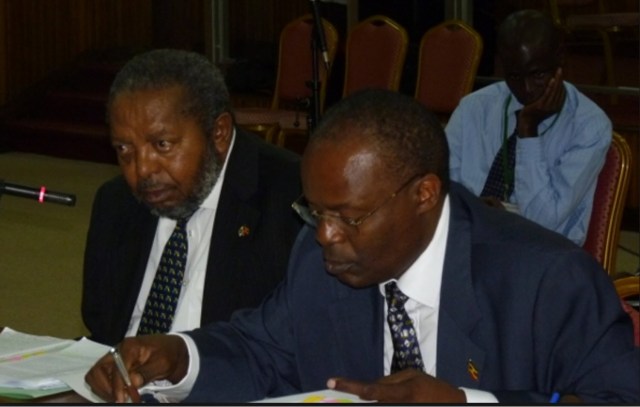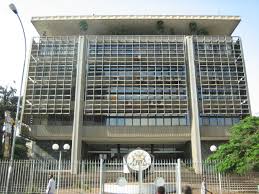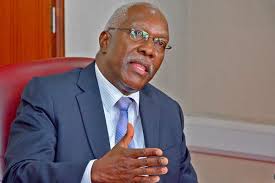
Bank of Uganda (BoU) Governor Emmanuel Tumusiime-Mutebile has denied conflicting with his deputy, Dr Louis Kasekende, saying the allegations are unfounded and meant to tarnish the reputation of the Central Bank.
On Wednesday, we reported that a power struggle between Mr Mutebile and Dr Kasekende over key appointments and policy decisions is threatening the institution’s credibility, with major implications for the economy.
But in a strong worded statement on Thursday, the Governor said the allegations are based on hearsay.
“I would also like to refute the allegation that I, my Deputy and other senior officials “fight each other”. I continue to count on the confidence and support of my Deputy and all other members of the Board of Directors, Executive Directors and staff,” Mr Mutebile said.
“Yet again, this type of unfounded speculation betrays a misunderstanding of how the BoU is actually managed. As in all well managed institutions, decisions in the BoU are not taken by individual staff on their own, but through a committee structure and set policies and procedures which have been established by the Board of Directors,” he added.
The central bank has been thrust in the public eye over its recent handling of the Crane Bank sale to dfcu Bank and the recent staff changes at the institution, which saw Parliament and the Inspector General of Government intervene.
But on Thursday, Mr Mutebile said whereas people have a right to be critical of the bank as a public institution, he dismissed claims that BoU management is incompetent and is no longer up to the task of executing its constitutional mandate.
“If we are to objectively judge the competence of the BoU, we should look at how it has performed in relation to its core strategic objectives: controlling inflation and regulating the banking sector to protect depositors and the overall stability of the financial sector,” he said.
The Governor explained that BoU has met it target of holding annual core inflation to a maximum of 5 percent on average over three years, which is normally considered to be a medium term horizon.
“Over the last three years, from April 2015 to March 2018, annual core inflation has averaged 5.1 percent. That hardly suggests that, in terms of macroeconomic management, the BoU is incompetent,” he said.
With regard to the regulation and supervision of banks, he said in the last three years, BoU has had to intervene in three out of the 26 banks operating in Uganda, two of which, Global Trust and Crane Bank, were closed.
“In all three cases, the interventions of the BoU followed the procedures set out in the banking laws; the Financial Institutions Act. Because of prompt interventions by the BoU, customers never lost any of their deposits in any of these banks,” Mr Mutebile said.
“Nor was there any contagion to the rest of the banking industry which might have threatened the stability of the financial sector, for example there were no bank runs. Therefore, I believe that it is fair to conclude that the BoU has succeeded in delivering on its core mandate of protecting depositors and the stability of the financial system,” he added.

He also explained that as a result of good performance, BoU has been recognized by various independent continental and global entities.
“In my capacity as Governor, the American (USA) Biological Institute recognised me as an outstanding contributor to Uganda in 2009. In addition, I was named Central Bank Governor of the Year in Africa by the Africa Banker Magazine in 2011 and by the African Investor Group (Ai) in 2013,” he said.
Mr Mutebile also dismissed allegations that Dr Kasekend or other staff could have acted singlehandedly and with personal interest in the resolution of Crane Bank.
“Such claims betray a clear lack of understanding of the established processes within the BoU and with other stakeholders within Government regarding the Bank’s mandate. The BoU and Government broadly, has in place robust systems that ensure that we are all held to the highest possible levels of integrity. Such accountability systems include regular audits by the Internal Audit department of the BoU, Statutory audits by the Auditor General, forensic audits whenever commissioned and parliamentary inquiries which are fully complied with whenever instituted,” he said.

Auditor General (AG) John Muwanga has started a wider investigation into how Bank of Uganda (BoU) spent Shs200 billion, which was used to bail out Crane Bank before it went bankrupt.
The AG probe comes on the backdrop of petitions by former Crane Bank and central bank employees who wondered why the bank collapsed despite government injecting money to keep it afloat.
In 2016, the government injected the money in Crane Bank after Cabinet ministers warned that the collapse of the bank posed a risk to the entire financial sector.
Petitioners now want Mr Muwanga to investigate the management of Crane Bank under BoU before it was sold to dfcu Bank.




